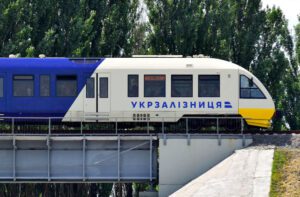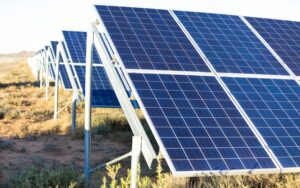
Ukraine in August 2021 may receive trains to test the work of the Kyiv City Express project.
“The first project will be Kyiv City Express. It is already working. Now we are launching, we are looking at it in a test mode. We will receive several trains for testing. I hope that it will be in August this year. And, accordingly, we will start working this year as well,” the deputy head of the President’s Office, the coordinator of the Big Construction program, Kyrylo Tymoshenko, said during the Ukraine 30 forum.
According to him, the rolling stock of suburban trains in Ukraine has practically never been updated, with the exception of several reconstructions.
“Now we are cooperating with several well-known world companies, specifically dealing with City Express projects, and are launching them in Kyiv, Kharkiv and Dnipro. These are the three largest agglomerations around these cities,” Tymoshenko stressed.
As reported, the Swiss company Stadler has chosen a location for the deployment of a plant for the production of electric trains in Ukraine. This year it will hand over one or two trains for testing.

The Norwegian company Scatec on July 6 held the opening ceremony of its fifth solar power plant (SPP) in Ukraine with a capacity of 40 MW in Chyhyryn district (Cherkasy region).
As reported, from July 2, the company also began commercial operation of its largest in Ukraine SPP Prohresivka (Mykolaiv region) with a capacity of 148 MW, and from the beginning of June – a 25 MW solar plant Kamyanka (Cherkasy region).
In addition, in 2020, Scatec launched a 54 MW SPP near Bohuslav (Kyiv region), and in 2019, together with Rengy Development Group, implemented its first Ukrainian project of a 47 MW SPP in Mykolaiv region.
Thus, the total capacity of solar generation facilities built by Scatec in three regions of Ukraine has reached 314 MW.
According to PJSC Cherkasyoblenergo, the construction of a 40 MW SPP near Chyhyryn, in particular, has become one of the largest investment projects in Cherkasy region.
In order to connect the Scatec facility to the power grids, Cherkasyoblenergo carried out technical re-equipment of the 150/35/10 kV Orbita substation, and also built two overhead power transmission lines of 150 kV Orbita-Greenteco-SPP. The works worth UAH 139 million were partially financed from the funds of Greenteco SPP LLC (Scatec Ukraine) as a payment for connecting to the power grids.
“The team of Cherkasyoblenergo, for its part, fully supports the development of “green” energy in Cherkasy region and will do everything possible to increase its share in the total amount of electricity generated in the regional power grid,” chairman of the board of the company Oleh Samchuk said.

The Cabinet of Ministers, pursuant to the law on ensuring equal conditions for fathers and mothers in caring for a child, approved the procedure for granting parental leave to fathers for 14 days.
The corresponding resolution was approved by the government at a meeting on Wednesday.
According to the draft resolution, the father of a newborn child may be granted such leave even if he is not in a registered marriage with his mother, but lives with her. Also, the grandmother or grandfather of the child, or another adult relative who actually takes care of the child, can apply for such leave.
The leave is provided once, lasting up to 14 days, as indicated in the draft resolution. It must be used before the 104th birthday of the child.
At the same time, in the case of the birth of two or more children, the duration of such leave does not increase, the draft resolution says.

Hungary on Wednesday, July 7, has resumed the passage of persons and vehicles through the checkpoints Lónya and Barabash.
“We ask citizens who plan to cross the border with Hungary to take into account that the pass is carried out at the checkpoint Kosyno – Barabash from 8:00 to 20:00 [Kyiv time] and at the checkpoint Dzvinkovoe – Lónya from 8:00 to 19:00 [Kyiv time],” the State Border Guard Service of Ukraine said on Wednesday.
Earlier, the Hungarian side reported that the ability to cross these checkpoints was temporarily limited. The work of checkpoints on the Ukrainian side did not stop.

U.S. Secretary of State Antony Blinken has named five ways the Ukrainian government can develop the progress made and where the United States is ready to help Ukraine.
First. To adopt the draft law on reforming the High Council of Justice, followed by the law on the High Qualifications Commission of Judges. Together, these laws will ensure a transparent process for the selection of judges. Second. To ensure that the selection of the leadership of the National Anti-Corruption Bureau and the Specialized Anti-Corruption Prosecutor’s Office is transparent, credible and based on merit, Blinken said in a video message to participants of the Ukraine Reform Conference, which is taking place in Vilnius on Wednesday.
According to him, the third step is to pass a law on transparent corporate governance, which protects the independence of the supervisory board, CEOs and complies with the standards of the Organisation for Economic Co-operation and Development (OECD).
Blinken called the fourth step the adoption of legislation that demilitarizes, depoliticizes the Security Service of Ukraine, and leaves the work of combating corruption and combating organized crime to other government institutions created for this purpose.
And fifth. Bring corrupt officials to justice. A number of investigations have been carried out, but no senior official has been tried or convicted of corruption since 2014. People need to see that the system is working in order to believe in it, the Secretary of State said.

The manufacturer of upholstered furniture Morgan Furniture LLC (Kvasyliv, Rivne region) plans to launch a line for the production of foam rubber with a capacity of 24,000 tonnes per year in August 2021, investments in the creation of which amount to $4 million, said head of Rivne Regional State Administration Vitaliy Koval.
“Already in August, the international company Morgan Furniture is launching a foam rubber production line. Development and prospects were discussed today at a meeting with co-owner [of Morgan Furniture] Franklin McMahon and director Roman Basarab. They plan to increase production capacity and triple production volumes,” Koval wrote on Facebook on Tuesday.
He recalled that the company has been operating for nine years, daily exporting 1,000 sofas, beds and other upholstered furniture and providing jobs for more than 1,000 employees.
“The launch of the foam rubber line will not only create new jobs, but also reduce the cost of production. After all, they had to buy this material from the monopolist and spend additional funds on logistics. Now the enterprise will have a closed furniture production cycle,” the head of the Regional State Administration said.
According to him, with McMahon they also discussed the formation of a furniture cluster – one of the main priorities for the development of Rivne region.
“And Morgan Furniture cannot only join the merger, but also take 1-1.5% of the European furniture market, creating a competitive environment,” said Koval.
“Our common task is to grow faster than the market. As a result, we will increase the region’s share in the national production of furniture products, which will allow us to attract additional resources, create jobs and attract new investors,” the head of the region said.
As reported, in June 2012, the McMahon spouses opened a furniture factory, Morgan Furniture LLC, on the basis of the Rivnesilmash plant, which they acquired. They invested EUR 10.5 million in this production facility. Initially, the company employed 120 people.
In 2020, Morgan Furniture LLC slightly reduced its net income compared to 2019 – to UAH 912.15 million and received a UAH 31.63 million loss against a net profit of UAH 45.03 million.
The company is part of Home Group SA, a large European manufacturer of household goods, which is registered in Luxembourg.
The holding has production facilities in Poland, the Baltic countries and Ukraine.
In June 2017, the Antimonopoly Committee of Ukraine allowed the Chinese furniture group ManWah to acquire a 50% stake in Home Group.